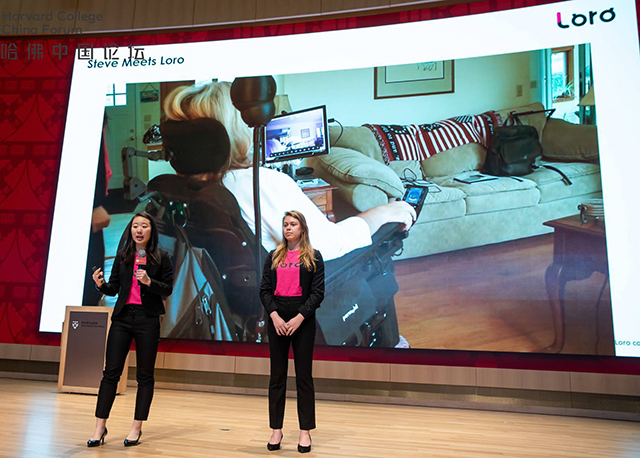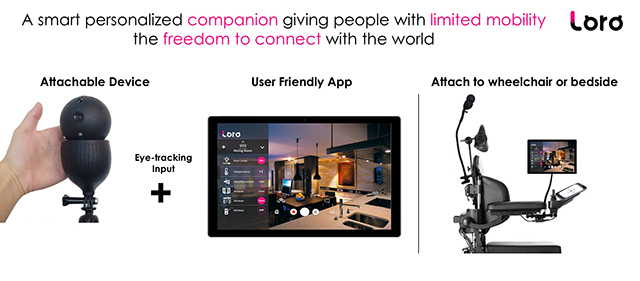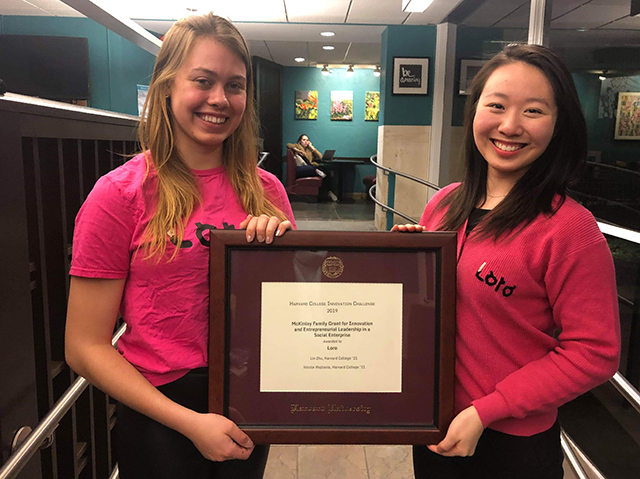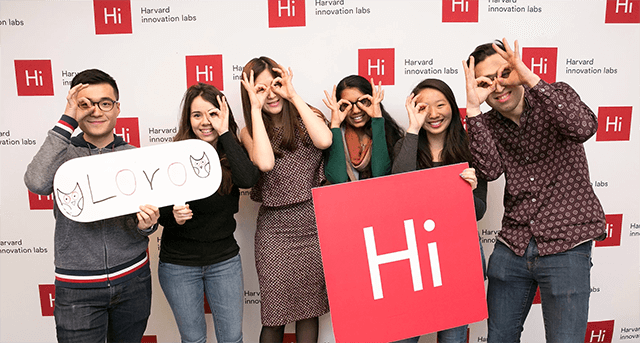News
Loro team members (from left) Frank Gao, Vanessa Cunha, Johae Song, Krithika Swaminathan, Lin Zhu, and David Hojah have developed a smart, personalized companion to help people with limited mobility connect with the world. (Photo provided by Loro)
In 2017, Harvard freshman Lin Zhu walked into the Prize4Life ALS Assistive Technology Hackathon, a 36-hour engineering frenzy that challenged students’ ingenuity and stamina as they developed technology for people with ALS.
Hackathon participants asked mentors who had ALS, “If we could build anything to make your life easier, what would it be?” Zhu was inspired by the words of Steve Saling, an engineer and founder of the ALS Residence Initiative, who has been fully immobilized by the degenerative disease.
“He told us that a huge problem is the loss of independence and lack of assistive technologies, as people with ALS are locked in their bodies,” said Zhu, A.B. ’21 a computer science concentrator at the Harvard John A. Paulson School of Engineering and Applied Sciences. “After learning from Steve, we thought it would be helpful to develop a device to help people with ALS see around them and drive their wheelchairs more safely, since they can’t rotate their necks.”
Zhu quickly joined forces with a few graduate students from Harvard and MIT who shared the same vision—David Hojah, Johae Song, and Vanessa Cunha. They wasted no time starting work on a prototype. The team used a pole-mounted 360-degree camera to display live video of a wheelchair-bound person’s surroundings onto a screen, incorporating eye-tracking technology into an app that enabled people with limited mobility to control the camera.
The team won the hackathon, receiving $10,000 and validation that their proof-of-concept prototype had potential to help people suffering from ALS. Building off that momentum, the team buckled down to turn their quick-and-dirty prototype into a product that could help the 190 million people worldwide who face mobility challenges.
At the end of 2017, the team launched a startup, Loro. Loro, which means “parrot” in Spanish, is a smart companion device always at a user’s side, explained Zhu, the company’s CFO.

Lin Zhu (left) and Nicky Wojtania pitch Loro during the Harvard College China Forum Pitch Competition, where they won second prize. (Photo courtesy of the Harvard College China Fund)
“I went to users’ homes for about four hours every weekend to really understand their pain points and learn how we could further our prototype,” she recalled. “It took a lot of patience and understanding to figure out the best features we could build. The process was incremental. We tweaked our prototype week by week.”
They also stayed connected with Saling, who served as a principle advisor as they fine-tuned the device.
The current Loro product is a device that is mountable on a wheelchair or bedside, with features including: a 360-degree rotating camera, laser pointer, flashlight, and object detection system; and a user-friendly app. The system is controlled by eye-tracking technology.
The Loro app incorporates fast and seamless text-to-speech and speech-to-text capabilities to help users communicate, as well as integration with the Amazon Alexa smart home device, allowing users to turn lights on and off, control room temperature, and open and close window shades, Zhu said.
One feature that is especially unique—Loro enables users to take hands-free photos.
“We take pictures for granted all the time,” she said. “People who have limited mobilities can’t just take a picture and record memories. Our product allows users, through eye tracking technology, to take photos and share them through social media, which can help people build social connections.”

Loro’s ability to comprehensively address so many challenges makes it stand out among competing products, Zhu said. Helping wheelchair-bound users see around them improves safety, while enhancing their ability to communicate and control their environment gives them tools no other system provides in one package, she said.
By helping users with limited mobilities gain more independence, Loro can reduce caretaker costs by about 20 percent, which is especially important since about 40 percent of those with mobility challenges declare bankruptcy due to high caretaker costs and inefficient technologies, Zhu said.
“By thoroughly testing our product end-to-end with users, we have built a holistic and intuitive device that can be used by people with many different conditions and physical challenges,” said David Hojah, a master’s student at the Chan School of Public Health and CTO of Loro.
For Zhu, developing Loro’s different functionalities has been technically challenging, but the biggest difficulties involve funding, since a hardware startup incurs many initial expenses. The team has drawn on the support and mentorship provided by the Harvard Innovation Labs, and was recently named the Mckinley Social Gold Medal Winner at this year’s Harvard i3 Innovation Challenge, sponsored by the Technology and Entrepreneurship Center at Harvard.

Nicky Wojtania and Lin Zhu display Loro's award from the i3 Innovation Challenge. (Photo provided by Loro)
“It is really important to have a team where everybody is incredibly driven, and driven by the same goals,” she said. “We have faced many challenges, and a lot of points where we’ve had to rethink our product, business, and financing strategies. A successful team has to have the grit to overcome the highest hurdles.”
Having pushed through those initial challenges, Zhu and her cofounders are preparing to launch their product later in 2019. They are currently pilot-testing with 40 users, fixing bugs as they gear up for launch.
Zhu looks forward to sharing the product with potential investors and pitching Loro at startup competitions.
“For me, it is exciting to tell the story of Loro through the numbers, to pitch in front of judges and explain our mission and how we are going to get there,” she said. “But what I’m most excited about is showing our product to users, having them test it and getting their feedback. Being there when they see that this could be a life-changing product is the most rewarding. That’s what really drives me, to be able to deliver a solution that will improve the lives of so many.”

Loro team members from left to right: Frank Gao, David Hojah, Johae Song, and Andres Montoya, with Loro user Jessie Levine. (Photo provided by Loro)
Topics: Computer Science, Entrepreneurship
Cutting-edge science delivered direct to your inbox.
Join the Harvard SEAS mailing list.
Press Contact
Adam Zewe | 617-496-5878 | azewe@seas.harvard.edu



